Romy Gemmell's Blog, page 52
February 13, 2012
Lovely Liebster Award
I'm so touched to have received two more of the lovely Liebster Awards - German for dearest or beloved. How appropriate for this Valentine week. Many thanks to online writing friend Paula Martin, and fellow Muse author Jane Richardson whose own blogs are well worth visiting.

I'm supposed to tell you five things about myself and pass the award on to a few blogs with fewer than 200 followers.
I'll make the five things snappy favourites, lest I begin to bore you!
1. Favourite classical music is baroque: Bach, Handel, Albinoni, Vivaldi
2. Favourite colour is green, or sometimes purple
3. Favourite bird is the eagle, or an owl
4. Favourite animal is the tiger, or penguin
5. Favourite sculpture is Rodin's The Kiss
And now I'm passing the award on to a few of my writing friends:
My lovely daughter Vikki whose creative blog, Through the looking glass, deserves more readers, and to encourage her to write more posts!
A newish interesting blog from five lovely writers at novel points of view
Interesting writer of crime and historicals, Chris Longmuir
Irreverent and amusing poet and crime writer, Michael Malone
Philosophical prolific writer of many genres, Bill Kirton
I follow many, many deserving bloggers but I'm sticking closer to home on this occasion!
Rosemary

I'm supposed to tell you five things about myself and pass the award on to a few blogs with fewer than 200 followers.
I'll make the five things snappy favourites, lest I begin to bore you!
1. Favourite classical music is baroque: Bach, Handel, Albinoni, Vivaldi
2. Favourite colour is green, or sometimes purple
3. Favourite bird is the eagle, or an owl
4. Favourite animal is the tiger, or penguin
5. Favourite sculpture is Rodin's The Kiss
And now I'm passing the award on to a few of my writing friends:
My lovely daughter Vikki whose creative blog, Through the looking glass, deserves more readers, and to encourage her to write more posts!
A newish interesting blog from five lovely writers at novel points of view
Interesting writer of crime and historicals, Chris Longmuir
Irreverent and amusing poet and crime writer, Michael Malone
Philosophical prolific writer of many genres, Bill Kirton
I follow many, many deserving bloggers but I'm sticking closer to home on this occasion!
Rosemary
Published on February 13, 2012 02:14
February 9, 2012
Author Spotlight (and Guest Blogger): Lindsay Townsend
I am truly delighted to welcome British writer, Lindsay Townsend to my blog today. I'm often in awe of Lindsay's prolific writing output and she still takes time to run several forums, such as the one I joined, British Romance Fiction. I'm even more excited that Lindsay is my first guest blogger as she has written the following wonderful post on writing from fairytales. I loved her short novella,
A Christmas Sleeping Beauty
, and the way she turned the helpless Sleeping Beauty idea on its head. I'm now looking forward to reading
The Snow Bride
.
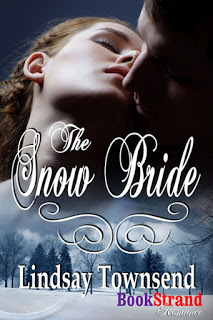
The Snow Bride Blurb:
She is Beauty, but is he the Beast?
Elfrida, spirited, caring and beautiful, is also alone. She is the witch of the woods and no man dares to ask for her hand in marriage until a beast comes stalking brides and steals away her sister. Desperate, the lovely Elfrida offers herself as a sacrifice, as bridal bait, and she is seized by a man with fearful scars. Is he the beast?
In the depths of a frozen midwinter, in the heart of the woodland, Sir Magnus, battle-hardened knight of the Crusades, searches ceaselessly for three missing brides, pitting his wits and weapons against a nameless stalker of the snowy forest. Disfigured and hideously scarred, Magnus has finished with love, he thinks, until he rescues a fourth 'bride', the beautiful, red-haired Elfrida, whose innocent touch ignites in him a fierce passion that satisfies his deepest yearnings and darkest desires.
So a warm welcome, Lindsay. My blog is all yours today! Thanks for this great post.
Inspired by Fairy Tales
Hello! First I want to say a huge thank you to Rosemary for her having me on her wonderful blog. It's full of good things! And second, I'm sure many writers use and adapt old tales, especially if they are writers of historical romance.
For myself, I've always loved fairy tales: African fairy stories, Old Peter's Russian tales, Grimm's fairy tales and the western classics – Cinderella, Sleeping Beauty, Beauty and the Beast, The Goose Girl, The Frog Prince. The themes of love, sacrifice, keeping promises (the theme of the Frog prince) transformation (in The Goose Girl and Cinderella) justice (again in Cinderella) are epic to me and timeless, worthy of exploration in romances and modern stories.
Cinderella, the story of selfless devotion rewarded, is a popular theme for many romance stories, with the 'prince' often an Italian or Arab billionaire who sweeps in to transform the heroine's drab, oppressed life. I'm sure there are romances to be written about the ugly sisters, too – positive stories where they grow from their petty spitefulness and obsession over balls and dances into generous, complete women, who also find love. That element of the happily ever after and the unexpected is strong in both fairy tales and in romance and both appeal to me greatly.
Fairy tales can also be epic, dealing with issues of life and death. Look at Gerda and her determination to win her brother out of enchantment in The Snow Queen. Look at Sleeping Beauty, where the prince rescues the princess from the 'death' of endless sleep.
Recently I did my own 'take' on Sleeping Beauty in my A Christmas Sleeping Beauty . I made it a story of transformation for both my heroine, Rosie, and the prince Orlando, who starts as a very arrogant and selfish young man who needs to learn to love and cherish. I didn't want my Rosie to be passive, simply waiting to be woken, so she is active in the story both through her dreams and through her speaking directly to the hero in a letter. I also added more urgency by making it a ticking clock story – Orlando must wake Rosie in three days or he loses his chance forever.
The story of Beauty and the Beast has thrilled me since I was a child, with its dark and menacing beginning, the terrifying beast and Beauty's courage and love for her father and ultimately for the beast. I was inspired by these basic tenets to write my own medieval version of Beauty and the Beast in my The Snow Bride . Magnus, the hero, has been hideously scarred by war and looks like a beast. He considers himself unworthy of love. Elfrida, my heroine, is also an outsider since she is a white witch, but she willingly sacrifices herself (as Beauty does in the fairy story) because of love, in her case her love for her younger sister, Christina, for whom she feels responsible. When she and Magnus encounter each other, I made it that they could not understand each other at first, to add to the mystery and dread – is Magnus as ugly in soul as in body? They must learn to trust each other, despite appearances, and come to love (just as in the original fairy tale).
I also added other fairy tale elements to The Snow Bride : magic, darkness, the idea of three (a common motif in fairy tales) spirits in the forest and more. Perhaps in the darker elements of my forest I was inspired by that other old fairy story – Red Riding Hood.
How about you? What inspires you in your reading or writing?
Lindsay Townsend
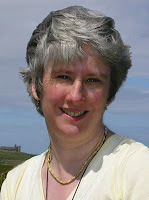 Lindsay Townsend is fascinated by ancient world and medieval history and writes historical romance covering these periods. She also enjoys thrillers and writes both historical and contemporary romantic suspense. When not writing, Lindsay enjoys spending time with her husband, gardening, reading and taking long, languid baths – possibly with chocolate. Author's Other Works:
Lindsay Townsend is fascinated by ancient world and medieval history and writes historical romance covering these periods. She also enjoys thrillers and writes both historical and contemporary romantic suspense. When not writing, Lindsay enjoys spending time with her husband, gardening, reading and taking long, languid baths – possibly with chocolate. Author's Other Works:
A Knight's Vow – Kensington Zebra
A Knight's Captive – Kensington Zebra
A Knight's Enchantment – Kensington Zebra
To Touch The Knight – Kensington Zebra
Flavia's Secret – Siren-Bookstrand
Blue Gold – Siren-Bookstrand
Bronze Lightning – Siren-Bookstrand
Escape to Love – Siren-Bookstrand
Silk and Steel – Siren- Bookstrand
Chasing Rachel – Siren-Bookstrand
A Secret Treasure – Siren-Bookstrand
Holiday in Bologna – Siren-Bookstrand
Palace of the Fountains – Siren-Bookstrand
The Snow Bride - Siren-Bookstrand
A Christmas Seeping Beauty - Muse it Up Publishing
Midsummer Maid - Muse it Up Publishing (Forthcoming)
The Lord and Eleanor - Ellora's Cave (Forthcoming)
Among other places, you can find Lindsay on her historical romance website; Bookstrand; Kensington; Amazon (UK); Amazon (US)
Twitter: @lindsayromantic

The Snow Bride Blurb:
She is Beauty, but is he the Beast?
Elfrida, spirited, caring and beautiful, is also alone. She is the witch of the woods and no man dares to ask for her hand in marriage until a beast comes stalking brides and steals away her sister. Desperate, the lovely Elfrida offers herself as a sacrifice, as bridal bait, and she is seized by a man with fearful scars. Is he the beast?
In the depths of a frozen midwinter, in the heart of the woodland, Sir Magnus, battle-hardened knight of the Crusades, searches ceaselessly for three missing brides, pitting his wits and weapons against a nameless stalker of the snowy forest. Disfigured and hideously scarred, Magnus has finished with love, he thinks, until he rescues a fourth 'bride', the beautiful, red-haired Elfrida, whose innocent touch ignites in him a fierce passion that satisfies his deepest yearnings and darkest desires.
So a warm welcome, Lindsay. My blog is all yours today! Thanks for this great post.
Inspired by Fairy Tales
Hello! First I want to say a huge thank you to Rosemary for her having me on her wonderful blog. It's full of good things! And second, I'm sure many writers use and adapt old tales, especially if they are writers of historical romance.
For myself, I've always loved fairy tales: African fairy stories, Old Peter's Russian tales, Grimm's fairy tales and the western classics – Cinderella, Sleeping Beauty, Beauty and the Beast, The Goose Girl, The Frog Prince. The themes of love, sacrifice, keeping promises (the theme of the Frog prince) transformation (in The Goose Girl and Cinderella) justice (again in Cinderella) are epic to me and timeless, worthy of exploration in romances and modern stories.
Cinderella, the story of selfless devotion rewarded, is a popular theme for many romance stories, with the 'prince' often an Italian or Arab billionaire who sweeps in to transform the heroine's drab, oppressed life. I'm sure there are romances to be written about the ugly sisters, too – positive stories where they grow from their petty spitefulness and obsession over balls and dances into generous, complete women, who also find love. That element of the happily ever after and the unexpected is strong in both fairy tales and in romance and both appeal to me greatly.
Fairy tales can also be epic, dealing with issues of life and death. Look at Gerda and her determination to win her brother out of enchantment in The Snow Queen. Look at Sleeping Beauty, where the prince rescues the princess from the 'death' of endless sleep.
Recently I did my own 'take' on Sleeping Beauty in my A Christmas Sleeping Beauty . I made it a story of transformation for both my heroine, Rosie, and the prince Orlando, who starts as a very arrogant and selfish young man who needs to learn to love and cherish. I didn't want my Rosie to be passive, simply waiting to be woken, so she is active in the story both through her dreams and through her speaking directly to the hero in a letter. I also added more urgency by making it a ticking clock story – Orlando must wake Rosie in three days or he loses his chance forever.
The story of Beauty and the Beast has thrilled me since I was a child, with its dark and menacing beginning, the terrifying beast and Beauty's courage and love for her father and ultimately for the beast. I was inspired by these basic tenets to write my own medieval version of Beauty and the Beast in my The Snow Bride . Magnus, the hero, has been hideously scarred by war and looks like a beast. He considers himself unworthy of love. Elfrida, my heroine, is also an outsider since she is a white witch, but she willingly sacrifices herself (as Beauty does in the fairy story) because of love, in her case her love for her younger sister, Christina, for whom she feels responsible. When she and Magnus encounter each other, I made it that they could not understand each other at first, to add to the mystery and dread – is Magnus as ugly in soul as in body? They must learn to trust each other, despite appearances, and come to love (just as in the original fairy tale).
I also added other fairy tale elements to The Snow Bride : magic, darkness, the idea of three (a common motif in fairy tales) spirits in the forest and more. Perhaps in the darker elements of my forest I was inspired by that other old fairy story – Red Riding Hood.
How about you? What inspires you in your reading or writing?
Lindsay Townsend
 Lindsay Townsend is fascinated by ancient world and medieval history and writes historical romance covering these periods. She also enjoys thrillers and writes both historical and contemporary romantic suspense. When not writing, Lindsay enjoys spending time with her husband, gardening, reading and taking long, languid baths – possibly with chocolate. Author's Other Works:
Lindsay Townsend is fascinated by ancient world and medieval history and writes historical romance covering these periods. She also enjoys thrillers and writes both historical and contemporary romantic suspense. When not writing, Lindsay enjoys spending time with her husband, gardening, reading and taking long, languid baths – possibly with chocolate. Author's Other Works: A Knight's Vow – Kensington Zebra
A Knight's Captive – Kensington Zebra
A Knight's Enchantment – Kensington Zebra
To Touch The Knight – Kensington Zebra
Flavia's Secret – Siren-Bookstrand
Blue Gold – Siren-Bookstrand
Bronze Lightning – Siren-Bookstrand
Escape to Love – Siren-Bookstrand
Silk and Steel – Siren- Bookstrand
Chasing Rachel – Siren-Bookstrand
A Secret Treasure – Siren-Bookstrand
Holiday in Bologna – Siren-Bookstrand
Palace of the Fountains – Siren-Bookstrand
The Snow Bride - Siren-Bookstrand
A Christmas Seeping Beauty - Muse it Up Publishing
Midsummer Maid - Muse it Up Publishing (Forthcoming)
The Lord and Eleanor - Ellora's Cave (Forthcoming)
Among other places, you can find Lindsay on her historical romance website; Bookstrand; Kensington; Amazon (UK); Amazon (US)
Twitter: @lindsayromantic
Published on February 09, 2012 01:07
February 6, 2012
Panster, Plotter or Procrastinator?
So which are you? The first two are often debated on writing blogs and many writers fall into either the panster camp, or plotter camp. Does it matter and is one better than the other? In the unlikely chance that someone hasn't come across the terms, here's a simplified recap: a panster normally writes 'by the seat of the pants', without a complete plan preferring to see where the story takes them, while a plotter (as it suggests) begins only after planning out a story or novel in fairly comprehensive detail.
And the procrastinator? That's me. Only, until this weekend I always said I'm a panster - I've never plotted a story or novel in my life, so far. Now, I'm convinced that panster is just another word for procrastinator in my case. I've been putting things off for as long as I can remember. And it has seeped into my writing life. Someone might recall the list of 'works started, or in progress' that I mentioned when debating about doing NaNoWriMo in November - it was a shocking list of procrastination. Novels started and abandoned, in the hope of getting around to finishing them 'one day'.
So this weekend, I admitted to being a world-class 'putter offer' of things (although husband has often said as much). Maybe that's why I'm a panster, in the hope that if I just start writing when I feel like it, I'll have a story or even novel at the end. But it's really because I can't be bothered knuckling down to doing the work in a planned, focused manner. And I need a deadline - a metaphorical whip - to make me finally produce the goods. I finally understand this after deciding at the last minute to enter a competition for a novella or novel. But I'd forgotten the deadline was yesterday and I only remembered late on Friday.
I could have let the chance go past, but I'm occasionally quite determined (husband calls it stubborn) and decided to turn a 3,000 word story into an almost 16,000 word short novella over the weekend - in between going out, cooking meals, ironing and watching a few TV programmes. Did I do it? With the skin of my teeth. But I have to say that keeping off the Internet and social media made the biggest difference in achieving it. And I loved writing it, as the basic outline of the novella was already partly in the short story - but I'd always felt this deserved to be a much longer piece with a completely new subplot added and had never been bothered to rewrite it as such. Just wish I'd given myself more time.
And this made me question the way I write. It flowed so much better through having that basic outline and knowing where the story was going before trying to write it all. Devoting concentrated time to it meant I stayed with the characters and they became even more real to me. And I completed a new piece of work that had long been waiting to become more than it was before. I'm going to have to think about this more carefully, once I catch up on everything I neglected over the weekend.
So does it matter if you're a panster or a plotter? We're told to find what's right for us. But I'm having trouble finishing the novel I've been writing as a panster and I know I'm going to have to change so much of what I originally started with. Maybe I need to stop and do a basic outline for the whole novel before writing another word of it, check I'm on the right track. Now I just have to make sure I don't procrastinate and leave the poor novel languishing for another month. As for the competition - it's not the fact I entered that excites me, it's completing my first short novella.
Rosemary
And the procrastinator? That's me. Only, until this weekend I always said I'm a panster - I've never plotted a story or novel in my life, so far. Now, I'm convinced that panster is just another word for procrastinator in my case. I've been putting things off for as long as I can remember. And it has seeped into my writing life. Someone might recall the list of 'works started, or in progress' that I mentioned when debating about doing NaNoWriMo in November - it was a shocking list of procrastination. Novels started and abandoned, in the hope of getting around to finishing them 'one day'.
So this weekend, I admitted to being a world-class 'putter offer' of things (although husband has often said as much). Maybe that's why I'm a panster, in the hope that if I just start writing when I feel like it, I'll have a story or even novel at the end. But it's really because I can't be bothered knuckling down to doing the work in a planned, focused manner. And I need a deadline - a metaphorical whip - to make me finally produce the goods. I finally understand this after deciding at the last minute to enter a competition for a novella or novel. But I'd forgotten the deadline was yesterday and I only remembered late on Friday.
I could have let the chance go past, but I'm occasionally quite determined (husband calls it stubborn) and decided to turn a 3,000 word story into an almost 16,000 word short novella over the weekend - in between going out, cooking meals, ironing and watching a few TV programmes. Did I do it? With the skin of my teeth. But I have to say that keeping off the Internet and social media made the biggest difference in achieving it. And I loved writing it, as the basic outline of the novella was already partly in the short story - but I'd always felt this deserved to be a much longer piece with a completely new subplot added and had never been bothered to rewrite it as such. Just wish I'd given myself more time.
And this made me question the way I write. It flowed so much better through having that basic outline and knowing where the story was going before trying to write it all. Devoting concentrated time to it meant I stayed with the characters and they became even more real to me. And I completed a new piece of work that had long been waiting to become more than it was before. I'm going to have to think about this more carefully, once I catch up on everything I neglected over the weekend.
So does it matter if you're a panster or a plotter? We're told to find what's right for us. But I'm having trouble finishing the novel I've been writing as a panster and I know I'm going to have to change so much of what I originally started with. Maybe I need to stop and do a basic outline for the whole novel before writing another word of it, check I'm on the right track. Now I just have to make sure I don't procrastinate and leave the poor novel languishing for another month. As for the competition - it's not the fact I entered that excites me, it's completing my first short novella.
Rosemary
Published on February 06, 2012 03:35
February 2, 2012
Author Spotlight: Myra Duffy
A very warm welcome to fellow Scottish writer, Myra Duffy. I've had the pleasure of getting to know Myra through our local writing group and I'm delighted to introduce her, and her writing, to a wider audience. You can read more about this interesting writer at the end of the interview.
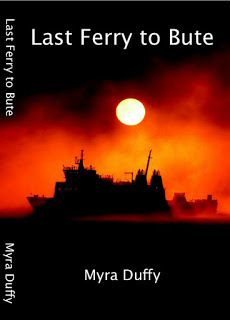
Myra's second Alison Cameron novel set on the lovely Scottish island of Bute, Last Ferry to Bute , is a truly absorbing mystery, with enough twists and turns to satisfy any reader of cosy crime and mystery. I particularly enjoyed the fact that protagonist, Alison, is an ordinary wife and mother who always seems to be in the wrong place at the wrong time. It also brought back memories of wonderful family holidays on Bute.
Last Ferry to Bute
Blurb
When her mother's friend, Jessie, expresses some concerns about her safety in the exclusive Hereuse Nursing Home where she now lives, Alison reluctantly agrees to investigate. She also is persuaded into helping with the arrangements for her college reunion on the island, resulting in frequent trips to Bute.
Then the mysterious deaths begin and Alison is soon caught in the middle of several strange occurrences. Between trying to discover if Jessie's worries have any foundation in fact, and concerns over the smooth antiques dealer with whom her besotted daughter is working, Alison is soon out of her depth. Then she is confronted with some mysterious deaths. Can she find out the answer to her questions before she too is in danger?
Myra kindly agreed to answer the following questions
You also write short stories and non-fiction, Myra - which do you prefer and why?
I've always enjoyed writing non-fiction because it comes from personal experience and I feel confident about my areas of expertise. The non-fiction I've written to date draws on my experience of initially managing a section within a large organisation, then latterly managing a small organisation and dealing with the problems that can arise from limited resources and both paid and voluntary staff. I hope to write an updated non-fiction management handbook for small organisations at some stage.
In recent years I've concentrated on fiction. I've always written fiction, but mostly for my own interest rather than with a view to publishing, though winning a number of prizes over the years has been very encouraging. Short stories tend to come to me almost fully formed - a sudden idea - and I like to write character based short stories with a sting in the tale. But mostly I prefer to write novels, though they are more difficult and more time consuming, of course. Over the length of the novel you have time to develop both character and plot. My Bute novels feature the same main character, Alison Cameron and I'm getting very well acquainted with her.
Do your management skills help you to organise your writing time?
I would love to say - absolutely! However, it's not quite as easy as that. Managing characters in a novel is even more difficult than managing people in real life, though in theory you should have much more control. But the discipline of management has helped me in planning and keeping to a plan. For example, I set myself the task of writing 50,000 words in a month for the Write a Novel in a month initiative last November (NaNoWriMo) and I did complete it, though by the end I was writing some 6,000 words a day. Probably that would fall into the category of 'Just in Time' management!
Why did you choose to write 'cosy crime'?
The main interest for me in any crime is the puzzle - who did it and why. I suppose this springs from the development of the characters and I like to keep the reader guessing as long as possible, though there are plenty of clues in the novel.
Bute is an ideal place to set such stories. It's a small island off the West coast of Scotland with a population of no more than 6,000 people, except in the summer when the population is swelled by many visitors. This gives me all the benefits of a location that has strong associations for people in the West of Scotland (many of whom spent childhood holidays on Bute) and indeed with the many people of Scottish descent throughout the world. It allows me to focus in on the characters and use a kind of shorthand for the locations. And in a small place you have lots of opportunities for local gossip and intrigues to help move the plot along! I prefer not to write about violent crime, as I write the kind of books I like to read.
How do the islanders feel about your Alison Cameron mysteries being set on Bute?
Some of them are rather bemused, I think. But everyone has been very supportive, very helpful. And I do know a number of people living on the mainland, having read the books, decided to take a trip to the island. So I suppose I'm doing my bit for island tourism, though I am very careful to have a large disclaimer about the characters not being based on anyone I know. I do use real locations, but often change details for purposes of the plot.
I must add that the island isn't the hotbed of crime that my novels suggest. In fact there is very little crime and it is a beautiful place with lots of unspoiled beaches and excellent walking, including the West Island Way. A lot of money is being spent on upgrading facilities, including the Art Deco Rothesay Pavilion which features strongly in the next book.
Do you have a favourite writing place?
I write in the attic, which isn't nearly as Spartan as it sounds! I have a PC facing a blank wall to avoid distractions. But I can write anywhere and often write some of my novel on the ferry to Bute.
What are you working on now?
My current novel, the work-in-progress, is for the moment called Last Dance at the Rothesay Pavilion and the plot centres on the renovation of the Pavilion. During the last war Bute (especially Rothesay) was a very busy place as many army and navy personnel, including some from Canada, were stationed there and there is a fund of stories about what went on. Ettrick Bay, for example was used as a practice run for the D-Day landings. I'm weaving some of this history into the novel and I hope the twist will please readers.
Any tips for new writers?
Join a writers' group! There's no doubt in my mind that joining Erskine Writers a few years ago was just the impetus I needed to take my fiction writing seriously. Everyone has been so supportive, I've learned lots and the opportunities to enter competitions and receive advice from the judges have given me exactly the kind of help I needed. Writing can be a very solitary business and apart from the opportunities to develop your skills, a writing group offers a great social focus.
Thanks for those great answers, Myra, and for being my guest today! All the best with your novels.
Last Ferry to Bute is available from Amazon (UK), in print, and at the special e-book price of £1.99 for a limited period. Also available from Amazon (US). The previous Alison Cameron mystery on Bute, The House at Ettrick Bay , is also available from Amazon.
You can pop over to Myra's blog to read a little about Bute and perhaps hear what Last Ferry to Bute protagonist Alison Cameron has to say for herself.
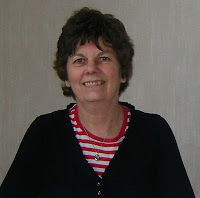 A graduate of the University of Glasgow, Myra Duffy's early career was in Education, with teaching posts (secondary and Further Education) in London, Madrid and Glasgow. She then held further posts in Educational management, finally as Director of the Scottish Wider Access Programme (West).
A graduate of the University of Glasgow, Myra Duffy's early career was in Education, with teaching posts (secondary and Further Education) in London, Madrid and Glasgow. She then held further posts in Educational management, finally as Director of the Scottish Wider Access Programme (West).
Myra has written in a variety of genres since early childhood and still possesses a copy of her earliest novel, Jewels in the Snow, written at Primary school. She also wrote plays and on Friday afternoons the teacher allowed her to recruit classmates to act them out, or sometimes they were performed with glove puppets, a much loved Christmas present. Her first real success was winning a national writing competition at the age of thirteen. She continued to write and be published in local magazines during her schooldays and wrote short plays, performed at the local church.
Because of her background in management, she is a well established non-fiction author, specialising in educational articles and in management training handbooks for small organisations. Recently she's had the opportunity to devote more time to her first love – fiction. Myra has been a prize-winner in a number of competitions run by Erskine Writers, of which she is currently President and also had some success in the competitions of the Scottish Association of Writers (at their annual conference). A number of short stories have been in publications such as My Weekly and the Ireland's Own anthology.
Myra's preference is for writing novels and to date these comprise When Old Ghosts Meet (published 2009), and the first of the Bute novels The House at Ettrick Bay (published 2010). Her latest novel, Last Ferry to Bute (published 2011), is also set on the Isle of Bute. Both Bute novels have the same protagonist - Alison Cameron, an ordinary woman who finds herself involved in extraordinary events.
The work in progress is provisionally titled Last Dance at the Rothesay Pavilion but Myra says she "is struggling with a bearded man who keeps appearing and I'm not quite sure what he intends to do!"

Myra's second Alison Cameron novel set on the lovely Scottish island of Bute, Last Ferry to Bute , is a truly absorbing mystery, with enough twists and turns to satisfy any reader of cosy crime and mystery. I particularly enjoyed the fact that protagonist, Alison, is an ordinary wife and mother who always seems to be in the wrong place at the wrong time. It also brought back memories of wonderful family holidays on Bute.
Last Ferry to Bute
Blurb
When her mother's friend, Jessie, expresses some concerns about her safety in the exclusive Hereuse Nursing Home where she now lives, Alison reluctantly agrees to investigate. She also is persuaded into helping with the arrangements for her college reunion on the island, resulting in frequent trips to Bute.
Then the mysterious deaths begin and Alison is soon caught in the middle of several strange occurrences. Between trying to discover if Jessie's worries have any foundation in fact, and concerns over the smooth antiques dealer with whom her besotted daughter is working, Alison is soon out of her depth. Then she is confronted with some mysterious deaths. Can she find out the answer to her questions before she too is in danger?
Myra kindly agreed to answer the following questions
You also write short stories and non-fiction, Myra - which do you prefer and why?
I've always enjoyed writing non-fiction because it comes from personal experience and I feel confident about my areas of expertise. The non-fiction I've written to date draws on my experience of initially managing a section within a large organisation, then latterly managing a small organisation and dealing with the problems that can arise from limited resources and both paid and voluntary staff. I hope to write an updated non-fiction management handbook for small organisations at some stage.
In recent years I've concentrated on fiction. I've always written fiction, but mostly for my own interest rather than with a view to publishing, though winning a number of prizes over the years has been very encouraging. Short stories tend to come to me almost fully formed - a sudden idea - and I like to write character based short stories with a sting in the tale. But mostly I prefer to write novels, though they are more difficult and more time consuming, of course. Over the length of the novel you have time to develop both character and plot. My Bute novels feature the same main character, Alison Cameron and I'm getting very well acquainted with her.
Do your management skills help you to organise your writing time?
I would love to say - absolutely! However, it's not quite as easy as that. Managing characters in a novel is even more difficult than managing people in real life, though in theory you should have much more control. But the discipline of management has helped me in planning and keeping to a plan. For example, I set myself the task of writing 50,000 words in a month for the Write a Novel in a month initiative last November (NaNoWriMo) and I did complete it, though by the end I was writing some 6,000 words a day. Probably that would fall into the category of 'Just in Time' management!
Why did you choose to write 'cosy crime'?
The main interest for me in any crime is the puzzle - who did it and why. I suppose this springs from the development of the characters and I like to keep the reader guessing as long as possible, though there are plenty of clues in the novel.
Bute is an ideal place to set such stories. It's a small island off the West coast of Scotland with a population of no more than 6,000 people, except in the summer when the population is swelled by many visitors. This gives me all the benefits of a location that has strong associations for people in the West of Scotland (many of whom spent childhood holidays on Bute) and indeed with the many people of Scottish descent throughout the world. It allows me to focus in on the characters and use a kind of shorthand for the locations. And in a small place you have lots of opportunities for local gossip and intrigues to help move the plot along! I prefer not to write about violent crime, as I write the kind of books I like to read.
How do the islanders feel about your Alison Cameron mysteries being set on Bute?
Some of them are rather bemused, I think. But everyone has been very supportive, very helpful. And I do know a number of people living on the mainland, having read the books, decided to take a trip to the island. So I suppose I'm doing my bit for island tourism, though I am very careful to have a large disclaimer about the characters not being based on anyone I know. I do use real locations, but often change details for purposes of the plot.
I must add that the island isn't the hotbed of crime that my novels suggest. In fact there is very little crime and it is a beautiful place with lots of unspoiled beaches and excellent walking, including the West Island Way. A lot of money is being spent on upgrading facilities, including the Art Deco Rothesay Pavilion which features strongly in the next book.
Do you have a favourite writing place?
I write in the attic, which isn't nearly as Spartan as it sounds! I have a PC facing a blank wall to avoid distractions. But I can write anywhere and often write some of my novel on the ferry to Bute.
What are you working on now?
My current novel, the work-in-progress, is for the moment called Last Dance at the Rothesay Pavilion and the plot centres on the renovation of the Pavilion. During the last war Bute (especially Rothesay) was a very busy place as many army and navy personnel, including some from Canada, were stationed there and there is a fund of stories about what went on. Ettrick Bay, for example was used as a practice run for the D-Day landings. I'm weaving some of this history into the novel and I hope the twist will please readers.
Any tips for new writers?
Join a writers' group! There's no doubt in my mind that joining Erskine Writers a few years ago was just the impetus I needed to take my fiction writing seriously. Everyone has been so supportive, I've learned lots and the opportunities to enter competitions and receive advice from the judges have given me exactly the kind of help I needed. Writing can be a very solitary business and apart from the opportunities to develop your skills, a writing group offers a great social focus.
Thanks for those great answers, Myra, and for being my guest today! All the best with your novels.
Last Ferry to Bute is available from Amazon (UK), in print, and at the special e-book price of £1.99 for a limited period. Also available from Amazon (US). The previous Alison Cameron mystery on Bute, The House at Ettrick Bay , is also available from Amazon.
You can pop over to Myra's blog to read a little about Bute and perhaps hear what Last Ferry to Bute protagonist Alison Cameron has to say for herself.
 A graduate of the University of Glasgow, Myra Duffy's early career was in Education, with teaching posts (secondary and Further Education) in London, Madrid and Glasgow. She then held further posts in Educational management, finally as Director of the Scottish Wider Access Programme (West).
A graduate of the University of Glasgow, Myra Duffy's early career was in Education, with teaching posts (secondary and Further Education) in London, Madrid and Glasgow. She then held further posts in Educational management, finally as Director of the Scottish Wider Access Programme (West).Myra has written in a variety of genres since early childhood and still possesses a copy of her earliest novel, Jewels in the Snow, written at Primary school. She also wrote plays and on Friday afternoons the teacher allowed her to recruit classmates to act them out, or sometimes they were performed with glove puppets, a much loved Christmas present. Her first real success was winning a national writing competition at the age of thirteen. She continued to write and be published in local magazines during her schooldays and wrote short plays, performed at the local church.
Because of her background in management, she is a well established non-fiction author, specialising in educational articles and in management training handbooks for small organisations. Recently she's had the opportunity to devote more time to her first love – fiction. Myra has been a prize-winner in a number of competitions run by Erskine Writers, of which she is currently President and also had some success in the competitions of the Scottish Association of Writers (at their annual conference). A number of short stories have been in publications such as My Weekly and the Ireland's Own anthology.
Myra's preference is for writing novels and to date these comprise When Old Ghosts Meet (published 2009), and the first of the Bute novels The House at Ettrick Bay (published 2010). Her latest novel, Last Ferry to Bute (published 2011), is also set on the Isle of Bute. Both Bute novels have the same protagonist - Alison Cameron, an ordinary woman who finds herself involved in extraordinary events.
The work in progress is provisionally titled Last Dance at the Rothesay Pavilion but Myra says she "is struggling with a bearded man who keeps appearing and I'm not quite sure what he intends to do!"
Published on February 02, 2012 00:59
January 31, 2012
Blog Interview and Research
Just mentioning that I'm profiled on Adriana Ryan's blog as her Alphabet Author for G - in case anyone has a few spare moments to waste.
I'm also talking about historical research from replica newspapers on my Romancing History blog - there just might be someone interested in that!
Rosemary
I'm also talking about historical research from replica newspapers on my Romancing History blog - there just might be someone interested in that!
Rosemary
Published on January 31, 2012 04:47
January 30, 2012
TV Drama
I'm sure many of us have been watching
Call the Midwife
and
Birdsong
the last couple of Sunday evenings. What wonderful drama for cold winter nights. I haven't read the book on which the first is based but I can't imagine it would be any better than watching the characters' lives unfold, and the way it portrays the awful living conditions in which some people lived.
Although I'm thankful at how much medicine and treatment have moved on, there is something reassuring about the humanity, compassion and capability of those nurses that reminds me of the reason I went into nursing straight from school, many years ago. I only lasted half way though the 3 year training before discovering I dislike hopitals, but at least the whole environment and training was so much more regimented and particular than it seems these days. If anyone is interested in the campaign to make nursing standards higher again, please have a look at Frances Garrood's new blog.
I did read Birdsong when it first came out, as I was studying the period at the time. I loved the novel, and Sebastian Faulks' writing, although I thought some of the early scenes of passion between Stephen and Isabelle in the book were over written. I did understand the idea behind it, to show the two extremes of passionate love and horrific war. But I thought the TV drama was beautifully filmed and loved the way it took us from the dreadful trenches to the passionate love affair through Stephen's flashbacks.
Much as I adore reading, as a visual person it's a stunningly good drama or film that remains in my mind long after the final credits. Even better when both the book and film are memorable - and novels are certainly better for filling in the little details that have to be missed out in filming. Best of both worlds!
Rosemary
Although I'm thankful at how much medicine and treatment have moved on, there is something reassuring about the humanity, compassion and capability of those nurses that reminds me of the reason I went into nursing straight from school, many years ago. I only lasted half way though the 3 year training before discovering I dislike hopitals, but at least the whole environment and training was so much more regimented and particular than it seems these days. If anyone is interested in the campaign to make nursing standards higher again, please have a look at Frances Garrood's new blog.
I did read Birdsong when it first came out, as I was studying the period at the time. I loved the novel, and Sebastian Faulks' writing, although I thought some of the early scenes of passion between Stephen and Isabelle in the book were over written. I did understand the idea behind it, to show the two extremes of passionate love and horrific war. But I thought the TV drama was beautifully filmed and loved the way it took us from the dreadful trenches to the passionate love affair through Stephen's flashbacks.
Much as I adore reading, as a visual person it's a stunningly good drama or film that remains in my mind long after the final credits. Even better when both the book and film are memorable - and novels are certainly better for filling in the little details that have to be missed out in filming. Best of both worlds!
Rosemary
Published on January 30, 2012 03:10
January 26, 2012
Book Review: The Help
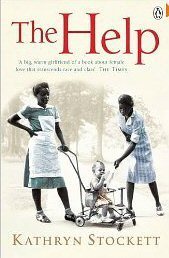
Instead of spotlighting an author today, I decided it was time for another book review. One of the most thought-provoking novels I read towards the end of last year was The Help by Kathryn Stockett. Set in Mississippi during the 1960s civil rights movement, this is the life-afirming story of three women who helped to change the perceptions of their small-town world.
When young white college graduate Skeeter returns home hoping to start a career in journalism, she discovers her beloved maid, Constantine, has gone and no one will tell her why. While her mother's only concern is that her daughter will make a good marriage, Skeeter soon discovers another side to her town in the lives of the black maids and she sets out on a life-changing course of action.
The other two main characters in The Help are Aibiline, the wise and wonderful maid who has brought up 17 white children, sometimes providing the love and affection they're denied by their parents, and Minnie, Aibline's sassy, loud-mouth friend who has a talent for cooking but can't keep a job. When they become involved in Skeeter's project, it is amidst the fear of being discovered and the subsequent horrific risk to them and their families.
While the characterisations are first class, it is the strength of the story line, the authentic setting, and the humanity that makes this an unforgettable novel. It is hard to imagine that this kind of situation existed during the swinging sixties, and it reminds us of the hard-fought battle for basic human rights.
The Help is now a film but I haven't managed to see it yet. If anyone has read the book and seen the film - do you think the film was an accurate portrayal of the novel?
Rosemary
Published on January 26, 2012 02:12
January 25, 2012
Robert Burns: The Farmer Poet
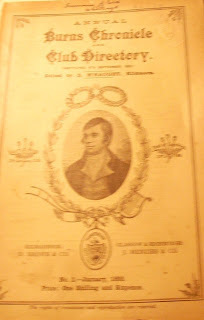
Happy Burns Day to anyone who is Scottish by birth or persuasion. I thought it might be good to acknowledge that this is our National Bard's annual birthday celebrations. Even in Scotland, Burns' popularity is mixed, although many primary schools still try to instill some knowledge of our famous poet into young minds, just as they did in my day.
I find the man fascinating and he appears in my mainstream novel that is seeking an agent just now. But it is his poetry that continues to inspire many. Apart from the well known Auld Lang Syne that is sung all over the world at New Year, and A Red, Red Rose and Ae Fond Kiss which are two of the most romantic songs, he penned so many wise words that they fill whole books.
Born on January 25th, 1759, Robert Burns started adult life as a farmer in Ayrshire, but his profound understanding of human nature soon catapulted him to fame when his first book of poetry, The Kilmarnock Edition, was published in 1786. The man himself had quite a reputation with the ladies and that sometimes overshadows his sheer genius at describing the human condition, whether with humour or insight.
Tonight, all over Scotland, and in other parts of the world, people will be celebrating a Burns Supper, when kilts and bagpipes and haggis will be on full show. But it is Burns' verse that will take pride of place. Here's the first verse of his humorous Address to the Haggis:
Fair fa' your honest, sonsie face,
Great chieftain o' the pudding-race!
Aboon them a' yet tak your place,
Painch, tripe, or thairm:
Weel are ye wordy o'a grace
As lang's my arm.
See if you can translate it into plain English! I'm putting another bit of history about Burns on my Romancing History blog.
Rosemary
Published on January 25, 2012 01:40
January 24, 2012
Milestones and Encouragement

I can hardly believe I've reached the blog milestone of having 100 friendly followers! Thank you so much to every single person who has ever taken the time to follow, to leave a comment, or to share a little bit of themselves with me online. I couldn't let it pass unremarked, or uncelebrated. So I'd like to offer some encouragement on the blog today, through a few of my favourite quotes. Maybe one or two will touch someone's heart or provide inspiration.
"No one can make you inferior without your consent." Eleanor Roosevelt
"Iron rusts from disuse; stagnant water becomes frozen; even so does inaction sap the vigour of the mind." Leonardo da Vinci
"A bird does not sing because it has the answer, it sings because it has a song." Chinese Proverb
"It is never too late to be what you might have been." Mary Ann Evans (George Eliot)
"Yesterday is but today's memory and tomorrow is today's dream." Kahlil Gibran
Published on January 24, 2012 01:54
January 22, 2012
Blogging Friends and Awards
One of the most enjoyable aspects of blogging is all the lovely online friends we make in cyber world. Between seeing a photograph of each other and entering into dialogue and discussion on various subjects, it's almost as good as chatting over a cup of coffee sometimes - although I would prefer that if possible!
Another advantage of being part of this online community is the encouragement and support writers share around. And one of the cutest ways to do this is by passing on the various Blog Awards that occasionally do the rounds. I'm delighted to have received two such awards in as many days.
The first is the Liebster Award, German for 'dearest' - and how lovely is that - from charming blogger, Anne.

The Liebster Award should go to bloggers who have fewer than 200 followers and I'm delighted to award this to these five friendly bloggers:
Linda Kage; Jude Johnson; Ute Carbone; Ciara Gold; Anne Gallagher
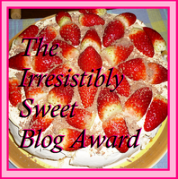
The other cute award is the Irresistably Sweet Blog Award from fun and interesting writer, Patsy.
For this other award, I have to tell you 7 things you might not know about me (oer - that's difficult!), then pass the award on.
My Seven:
1. When a child, I sang at the old people's Darby and Joan club with my brother.2. I loved the Girl from Uncle and wanted to be a secret agent when I grew up.3. Favourite colour is green.4. Loved colouring in the loops of letters in school exercise books (when very young!)5. Played an April Fool trick on an English teacher in high school (at least, I stupidly took the blame)6. Wanted to be an Air Hostess at one time (long ago).7. Went midnight swimming in the Isle of Man when sixteen.
And now I'm delighted to pass the Irresistable Blog Award on to:
C.K.Volnek; Marie T; Paula Martin; Carol Bevitt; K.C.Woolf
Rosemary

Another advantage of being part of this online community is the encouragement and support writers share around. And one of the cutest ways to do this is by passing on the various Blog Awards that occasionally do the rounds. I'm delighted to have received two such awards in as many days.
The first is the Liebster Award, German for 'dearest' - and how lovely is that - from charming blogger, Anne.

The Liebster Award should go to bloggers who have fewer than 200 followers and I'm delighted to award this to these five friendly bloggers:
Linda Kage; Jude Johnson; Ute Carbone; Ciara Gold; Anne Gallagher

The other cute award is the Irresistably Sweet Blog Award from fun and interesting writer, Patsy.
For this other award, I have to tell you 7 things you might not know about me (oer - that's difficult!), then pass the award on.
My Seven:
1. When a child, I sang at the old people's Darby and Joan club with my brother.2. I loved the Girl from Uncle and wanted to be a secret agent when I grew up.3. Favourite colour is green.4. Loved colouring in the loops of letters in school exercise books (when very young!)5. Played an April Fool trick on an English teacher in high school (at least, I stupidly took the blame)6. Wanted to be an Air Hostess at one time (long ago).7. Went midnight swimming in the Isle of Man when sixteen.
And now I'm delighted to pass the Irresistable Blog Award on to:
C.K.Volnek; Marie T; Paula Martin; Carol Bevitt; K.C.Woolf
Rosemary
Published on January 22, 2012 08:30
Romy Gemmell's Blog
- Romy Gemmell's profile
- 5 followers
Romy Gemmell isn't a Goodreads Author
(yet),
but they
do have a blog,
so here are some recent posts imported from
their feed.



